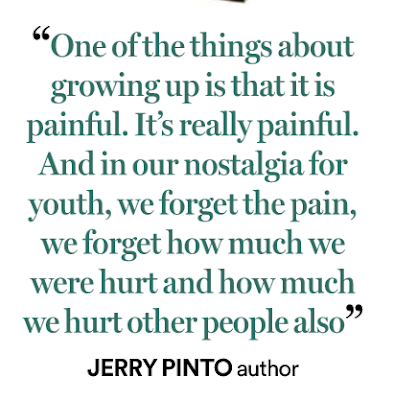Don’t be yourself
I have a student in one of my present classes who
gives me the creeps. He holds everyone in contempt and thinks that he is the
only perfect human being. He has a magnanimous attitude towards his mother, I observed,
whom he resembles way too much and who thinks that her son is nothing less than
an adorable prince. Let me call him Holden after the protagonist of J D
Salinger’s celebrated novel about an adolescent’s inability to grow up.
Holden – mine and not Salinger’s –
lives in his own world even if he is in the classroom not even pretending to be
listening to the teacher. He dreams keeping his eyes open when he is not really
sleeping. I have always wondered what he could be dreaming about. It took me a while
to realise that all his dreams are about himself because nothing engages his
mind except himself wherever he is.
Holden thinks that all other people
are nothing more than insects beside his eminence. He misses no opportunity to sneer
at people, their appearance, views, anything. Nobody and nothing comes up to
Holden’s expectations. If he is awake in the class, the teacher can expect some
snide comments from him made privately of course. If you ask him what he said
to his companion, he will just shrug his shoulders insolently.
A few months back, I told Holden that
we could perform a miracle together if he descended from his royal perch. I
told him that a miracle is nothing but a change of attitude. Just change the
way you look at the world and yourself, and the miracle will happen. You will
begin to love the world. And yourself too. Holden gave me his usual derisive
smile.
I didn’t give up, however. Holden holds a sway over me merely because he reminds me of my own adolescence. I had problems with myself as well as other people though I didn’t express my contempt as openly as Holden does. I wanted to save Holden from himself just as much as I wished there were such a redeemer for me in my adolescence. I am redeeming myself vicariously now by trying to redeem Holden.
“One of the things about growing up
is that it is painful,” says Jerry Pinto in connection with the release of his new
novel The Education of Yuri. “It’s really painful. And in our nostalgia
for youth, we forget the pain, we forget how much we were hurt and how much we
hurt other people also.”
Holden hurts me but not as much as I
hurt him. I accept Holden’s hurts with a self-conscious awareness that comes
from learning and experience. I let Holden be hurt assuming that it does him
some good – sooner rather than later. I do believe in miracles.
Holden is the kind of people who
shouldn’t be themselves. Try being somebody else for a change, I tell him. Looking
back, I know I’d have done much better being somebody else for a change.
PS.
This was provoked by Indispire’s new prompt: dedicate a post to the
wonderful weirdo in your life. #wonderfulweirdo

A change of attitude, yes
ReplyDeleteRemember Mr Lamb and Derry?
DeleteI could never forget
DeleteHolden will change when he grows up, when he is no longer a student, when he has to work for a living.
ReplyDeleteYes, I too think so. He's lucky to have very supportive and fairly affluent parents.
DeleteHari OM...
ReplyDelete...or, he may just grow up to be one of the world's narcissistic politicians... YAM xx
He has strong political affiliation, more because his father uses a particular party for business progress. I hope he learns something better than narcissism.
DeleteGood one!
ReplyDeleteThank you
Delete